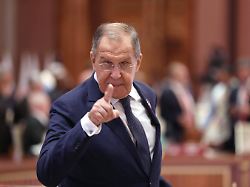According to Guterre’s letter
Lavrov dismisses grain deal proposal as “unrealistic.”
09/10/2023, 4:08 p.m
Listen to article
This audio version was artificially generated. More info | Send feedback
In order for the grain agreement to come about again, the UN chief is sending suggestions to the Russian Foreign Minister. But he sees clear stumbling blocks and wonders whether Guterres is just letting himself be put in charge. Turkish President Erdogan, in turn, warns against isolating Moscow.
Russian Foreign Minister Sergei Lavrov was not impressed by UN Secretary-General António Guterres’ move to revive the deal to export Ukrainian grain across the Black Sea. When reading the letter, one gets the impression that Guterres is allowing himself to be exploited by an interested party, Lavrov said on the sidelines of the G20 summit.
Accordingly, the UN chief has made proposals to reinstate the agreement, which is important for world nutrition. However, Lavrov complained that Guterre’s proposal to connect a branch of the Russian state agricultural bank Rosselkhosbank in Luxembourg to the international financial network Swift was “unrealistic.” Because “this branch does not have a license for banking operations, it will be closed,” Lavrov said. The planned involvement of the insurance provider Lloyd’s also leaves questions unanswered.
The Russian Foreign Minister reiterated that Russia is ready to reinstate the grain agreement if Russian demands are met. Moscow is demanding, among other things, that Rosselkhosbank itself be connected to Swift and that other Western sanctions against Russia be relaxed. Russia complains that as a result of the punitive measures it is being restricted in exporting its agricultural products.
Guterres is currently trying to save the deal with individual concessions to Moscow. In a letter to Lavrov, the UN Secretary General suggested that Moscow could be reconnected to Swift for certain payments by establishing a subsidiary through the sanctioned Russian agricultural bank. In his letter, Guterres makes three other suggestions to enable these Russian exports. It also involves thawing the frozen assets of fertilizer companies in Europe and allowing Russian ships to enter European ports. The letter indirectly suggests that the United Nations is working with the EU for these concessions.
Erdogan: Russia must be at the table on the grain issue
Turkish President Recep Tayyip Erdogan warned against isolating Russia in the discussion about a new edition of the export agreement. “A process that excludes Russia on the grain issue is unlikely to be sustainable,” Erdogan told reporters after the G20 summit in New Delhi. Turkey continues to try to mediate. A resumption is possible, said Erdogan, but referred to demands that Russia had made.
Russia terminated grain agreements concluded with Turkey and the UN at the end of July. The agreement enabled, among other things, the export of Ukrainian grain from the Black Sea ports of Odessa, Chorn omorsk and Pivdennyj (Yuzhny). In addition, there was an agreement with Russia to facilitate the export of Russian food and fertilizers. Kremlin chief Vladimir Putin emphasized at a meeting with Erdogan in Sochi, Russia, at the beginning of September that he only wanted to return to the grain agreement with Ukraine once all Russian demands had been met.
The agreement reached in the summer of 2022 through the mediation of Turkey and the UN was seen as a milestone in easing rising grain prices as millions of people face hunger. Ukraine is urgently dependent on the export of wheat and corn in order to continue to generate income despite the Russian war of aggression.
